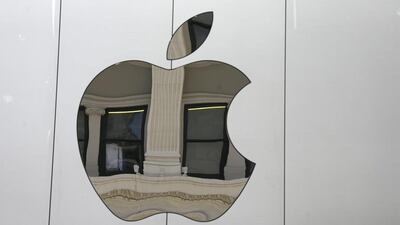Apple truly is a phenomenon, the most valuable company in the history of stock markets. This week its shares hit yet further new highs as its second-quarter figures are widely anticipated to show it has returned to growth after a disappointing – by Apple standards – first quarter. Already this year its shares have risen by 25 per cent, which means it has added more than US$150 billion of value for shareholders in just three months.
That, for the record, is more than two Rupert Murdoch empires, three Teslas (the company that is, not the car) or all the US motor companies added together. The total value of the company, as of Monday’s close, stood at a mind-boggling $770bn and analysts are looking forward to the day it goes through a trillion dollars. What a landmark that will be – the closing bell will jingle merrily on the floor of the New York Stock Exchange on that day.
Apple’s cash hoard now stands at more than $250bn, which is more than the GDP of Greece ($194bn – and going down). That’s enough to provide a hefty stimulus to the US economy if Donald Trump’s tax reforms can tempt Apple to bring it home, which they might well do.
We haven’t yet seen the latest figures, which were due to be announced after the US markets closed last night, but Apple provides the analysts with pretty detailed guidance. The consensus, usually bang on, is for revenue of $53 to $53.5bn, a rise of 5 to 6 per cent, and iPhone sales, which suffered a blip this time last year, to have recovered to 52 million to 53 million units compared with 51.2 million.
No other product in commercial history has even come near to matching the iPhone in terms of total sales, profitability or commercial success. Apple ran into supply problems in its first quarter with its pricier iPhone 7 but it got back on track quickly enough and analysts now reckon the average selling price of its phones to have risen from $641 a year ago to $658. The cost of making an iPhone is a fraction of the selling price – and Apple, unlike any other manufacturer in the world, gets full list price when it sells them through its own retail stores. Its margins overall are expected to rise by a percentage point to 39 per cent, a figure other manufacturing companies around the world can only dream about.
The big question now is: how much of its cash will Apple give back to shareholders? Last April it increased its dividend by 10 per cent to 57 cents and this year it is expected to raise that again to 62 cents. But of greater interest is its share repurchases, which boost the value of shareholders’ equity. Apple’s board has authorised $175bn in repurchases, but that could increase considerably in future years if Mr Trump does his stuff. “If and when reform happens, it gives us more flexibility. We could do more, more quickly,” Luca Maestri, Apple’s finance chief, said during a Goldman Sachs investor conference in February.
There are a few clouds on the horizon, of course, but they are manageable: sales in China are running 20 per cent down, basically because people are holding on to their phones for longer but also because local rivals such as Oppo and Vivo are making inroads into its market. And the iPad is struggling, despite a big cut in prices – the basic 9.7-inch iPad is now selling for $329 in the US, half the price of an iPhone, and even that doesn’t seem to be doing much for sales.
But there are also new products on the way. Like so many people in the world, I come fully Apple-equipped: iPhone, iPad and MacBook Air, and I’m seriously thinking of trading in my old Rolex for an Apple watch. When the first iPad was launched I walked all the way up Fifth Avenue to the Apple shop and bought three to take back to London, where they were not yet available. I could have sold them for a fortune. In June, Apple is expected to launch its Siri-powered “smart speaker” rival to the hugely successful Amazon Echo, and the next iPhone, ready for launch, will match the Samsung Galaxy S8 with an edge-to-edge screen and a new “augmented reality” camera. Along with Apple fans around the world, I shall be in the queue to buy them. What other company commands that customer loyalty? Trillion dollars, here we come.
Ivan Fallon is a former business editor of The Sunday Times.
business@thenational.ae
Follow The National's Business section on Twitter

